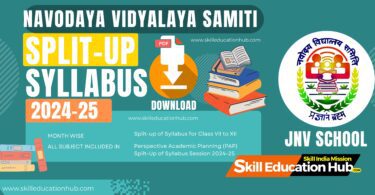In today’s rapidly evolving job market, having the right skills is crucial for employability and career advancement. Recognizing this need, India introduced the National Skills Qualification Framework (NSQF) to standardize and streamline its education and training systems. NSQF serves as a comprehensive framework that facilitates the integration of vocational, technical, and general education, ensuring that individuals are equipped with the necessary skills and knowledge to meet the demands of various industries.

The Need for NSQF
Before the inception of NSQF in 2009, each state in India operated independently, offering its own courses and syllabi. This lack of standardization posed significant challenges, as it hindered mobility and employability across different regions. Additionally, there was a disconnect between technical and general education, resulting in a gap between theoretical knowledge and practical skills required in the workforce. To address these issues and make the Indian education system more cohesive and globally competitive, the NSQF was introduced.

Key Objectives of NSQF
The primary objective of NSQF is to align education and training programs with industry requirements, thereby enhancing the employability of the youth and promoting self-reliance. By establishing a unified framework for qualifications, NSQF aims to:
- Provide a seamless pathway for individuals to acquire skills at various levels, from entry-level positions to advanced roles.
- Ensure that certifications are recognized nationally and internationally, facilitating mobility and opportunities for Indian workers abroad.
- Bridge the gap between formal and informal learning by recognizing prior experiential learning and skills acquired through non-traditional means.
- Facilitate credit transfer and progression within the education system, allowing individuals to switch between vocational, technical, and general education based on their preferences and career goals.

Operational Mechanism of NSQF
NSQF operates through a hierarchical structure comprising multiple levels, each corresponding to specific qualifications and skill sets. These levels encompass a wide range of fields, including agriculture, healthcare, manufacturing, hospitality, and information technology, among others. Additionally, NSQF incorporates a credit transfer policy, enabling individuals to accumulate credits for completed courses and transfer them to higher-level qualifications.
Certification and Recognition
One of the key features of NSQF is its emphasis on formal certification, which validates an individual’s skills and competencies. By obtaining recognized certifications, individuals can enhance their employability and access better job opportunities both domestically and internationally. Moreover, NSQF encourages the internationalization of Indian education, ensuring that certifications are aligned with global standards and recognized by employers worldwide.
Addressing Challenges and Remedies
Despite its numerous benefits, NSQF implementation has encountered challenges, particularly regarding awareness, infrastructure, and stakeholder coordination. To address these issues, concerted efforts are required at the institutional, governmental, and community levels. This includes enhancing awareness about NSQF among students, educators, and employers, improving infrastructure for skill development and assessment, and fostering collaboration between educational institutions, industry partners, and government agencies.

NSQF Aims to achieve several objectives, including:
- Quality Assurance: By ensuring that qualifications meet specific standards and requirements set by industry experts, the NSQF enhances the quality of vocational education and training. This allows employers to have confidence in the skills possessed by potential employees.
- Mobility and Flexibility: The framework provides a structured pathway for individuals to progress and upgrade their skills. It allows for easy movement between different levels of qualifications, enabling individuals to explore diverse career opportunities.
- Recognition of Prior Learning: NSQF acknowledges the skills and knowledge acquired through informal learning and work experience. It provides a mechanism to assess and certify these skills, empowering individuals to showcase their competencies.
- Industry Alignment: The NSQF fosters collaboration between industry stakeholders, educational institutions, and training providers. It ensures that the qualifications offered are responsive to the evolving needs of the industry and the labor market.
Here’s a simple chart explaining the NSQF levels:
| NSQF Level | Description |
|---|---|
| Level 1 | Basic literacy and numeracy skills |
| Level 2 | Basic operational knowledge and skills |
| Level 3 | Intermediate knowledge and skills |
| Level 4 | Advanced knowledge and skills |
| Level 5 | Advanced specialized knowledge and skills |
| Level 6 | Entry-level professional knowledge and skills |
| Level 7 | Advanced professional knowledge and skills |
| Level 8 | Advanced professional knowledge and skills with specialization |
| Level 9 | Managerial and leadership skills |
| Level 10 | Doctoral-level knowledge and skills |
NSQF official website: https://nsqf.qci.org.in/
NSQF level explained: https://www.nsqf.qci.org.in/NSQFLevel.aspx
NSQF implementation guidelines: https://www.aicte-india.org/education/nsqf
This chart provides a brief overview of the NSQF levels and the progression of knowledge and skills as individuals move through the levels.
Some keywords related to NSQF (National Skills Qualification Framework) include:
- Qualification Pack (QP)
- National Occupational Standards (NOS)
- Job Role
- Level Descriptor
- Competency
- Assessment
- Certification
- Sector Skill Councils
- Recognition of Prior Learning (RPL)
- Industry Partnership
- Skill Development
- Vocational Education
- Apprenticeship
- Skill Certification
- Training Provider
These keywords are commonly associated with the NSQF and are used in the context of skill development, vocational training, and certification within the framework.
In conclusion, the National Skills Qualification Framework (NSQF) represents a transformative initiative aimed at enhancing the quality, relevance, and accessibility of education and training in India. By integrating vocational, technical, and general education, NSQF seeks to empower individuals with the skills and knowledge needed to succeed in today’s dynamic workforce, thereby driving economic growth and social development.
National Skills Qualification Framework (NSQF) plays a vital role in enhancing the employability of individuals and addressing the skills gap in the job market. By providing a common reference point, standardized qualifications, and recognition of skills, NSQF ensures that individuals are equipped with the necessary competencies to succeed in their chosen careers. Its operational mechanism, certification processes, and efforts to address challenges make NSQF a reliable and effective framework for skill development and recognition.
For more information about NSQF, you can visit the official website of the National Skills Development Agency (NSDA) or the Ministry of Skill Development and Entrepreneurship, Government of India.
National Skills Development Agency: https://nsda.gov.in/
Ministry of Skill Development and Entrepreneurship: https://www.msde.gov.in/
- To get more information on rankings & accreditation head to the Skill Education Hub website now!
- What’s the Full Form of NSQF and Why It Matters?
- Everyday Benefits of Understanding NSQF Full Form
- NSQF Full Form Explained Simply for Everyone
- How Does Knowing the NSQF Full Form Help Your Career?
- Common Misunderstandings About NSQF Full Form
- Easy Steps to Learn the NSQF Full Form
- NSQF Full Form: Key Details You Should Know
- Why You Should Care About the NSQF Full Form
- The NSQF Full Form and Its Impact on Education
- Quick Guide to NSQF Full Form for Beginners







